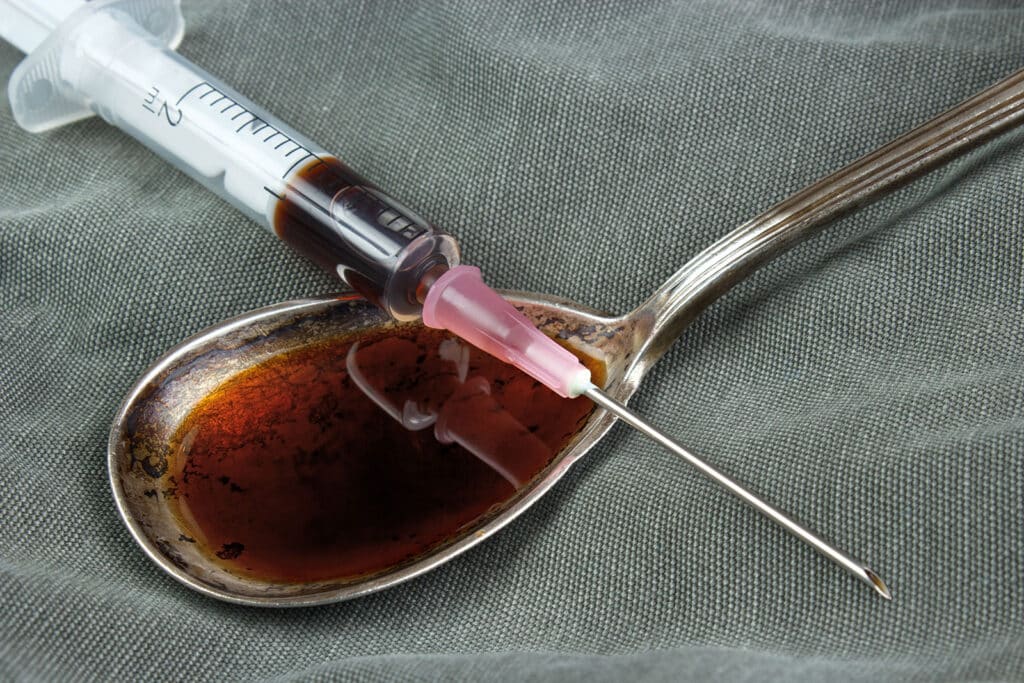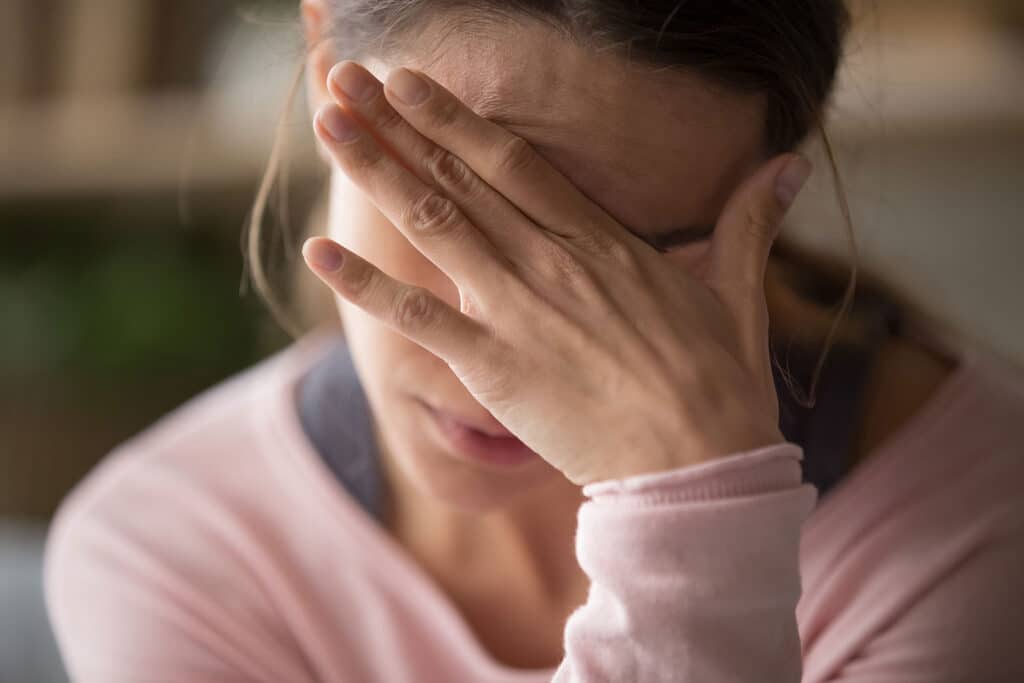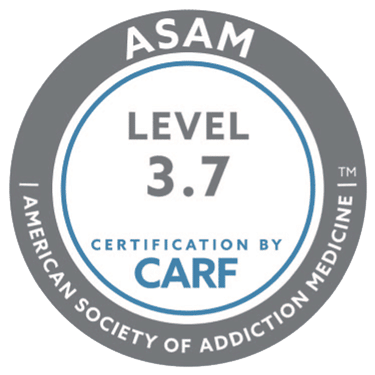Heroin is one of the most addictive drugs on the planet and goes by many names, including smack, horse, and brown sugar. It is listed as a Schedule I substance in the Controlled Substances Act, making it one of the most dangerous and illicit drugs in the U.S.

With that being said, the extreme potency of heroin makes its treatment extremely challenging but not impossible.
If you or your loved one is addicted to heroin, this guide will walk you through everything you need to know, including signs, symptoms, and heroin addiction treatment.
What Does Heroin Do to the Brain?
Heroin is a semi-synthetic opioid depressant. The drug is extracted as morphine from seed pods of the opium plant and then chemically altered to become diacetylmorphine, which is the chemical name of the drug.
This chemical process makes the side effects of heroin up to 3 times more potent than regular morphine. Heroin is also extremely addictive in all its forms, whether it’s snorted, injected, or smoked.
To understand how heroin works, you should know that our bodies have various receptors and neurotransmitters that are responsible for various sensations, such as pleasure, well-being, pain, etc.
Heroin strongly binds to specific opioid receptors in the brain that are normally bound to by endorphins, creating a much more potent pain-relieving (analgesic) effect.
Along with this effect, heroin also binds with other receptors to create a powerful depressant effect that slows down the central nervous system and associated functions, such as heart rate and breathing.
Additionally, heroin also produces an extreme sensation of euphoria (high), which is one of the main reasons people use the illicit drug.
Why Is Heroin So Addictive?
Like other opiates, heroin activates several reward centers in the brain that makes the brain crave them more.
However, the high tolerance of the drug means that it quickly loses its effect, which pushes users to take larger doses of the drug to achieve the same effect.
What makes heroin more addictive than many other drugs is its extreme potency. Since the drug is semi-synthesized, it binds with more receptors, creating a more concentrated effect than some other opioids.

How Common Is Heroin Addiction?
The semi-synthetic opiate is the third most common drug in the U.S. according to reports.
Although heroin is not as commonly abused as other drugs like cocaine and marijuana, the number of heroin users around the world is quite high because of its extreme addictiveness.
According to a survey by the National Survey on Drug Use and Health, around 1.1 million people (aged 12 or older) reported taking heroin in the U.S. in 2021.
The same report also found that 1.0 million people had heroin use disorder within the same period. In other words, around 91% of heroin users were addicted to the drug, which shows its extremely high addictiveness.
Why Heroin Addiction Treatment Is Critical
In addition to being one of the most addictive drugs out there, heroin is an extremely dangerous chemical that has serious immediate and long-term health risks.
The potent drug has a high tolerance rate that pushes users to increase its dose several times within a relatively short period.
As a result, overdosing on heroin becomes extremely likely, which can lead to coma, respiratory collapse, and death.
A recent report by the National Institute on Drug Abuse shows that over deaths 9,173 deaths reported in 2021 were related to heroin overdose. The numbers peaked in 2017 with 15,482 deaths.
Causes of Heroin Addiction
Like other opioid drugs, heroin addiction doesn’t have a specific direct cause.
Instead, it usually has a variety of risk factors that can highly increase the likelihood of developing substance use disorder or drug addiction . Here’s a quick look at the most common factors that may cause heroin addiction:
Personal Tendency for Substance Abuse and Family History
While it’s not scientifically confirmed if a genetic component is involved in heroin addiction, many studies found a correlation between having family members with a history of heroin abuse and becoming addicted to heroin.

Experimenting with Drugs at a Young Age
Many studies found that exposure to drugs at a young age makes a person at a high risk of developing heroin use disorder as they grow up.
Other risk factors associated with young age include peer pressure and being surrounded by people who are addicted to heroin.
Mental Illness and Psychological Trauma
Some studies reported that a person is more likely to use illicit drugs if they suffer from conditions like depression, anxiety, and bipolar disorder.
It was also noted that people who went through severe psychological traumas (like accidents and disasters) are also more likely to develop drug abusive patterns that lead to heroin addiction.
Signs of Heroin Addiction
Schedule I drugs have no medical uses and are completely illegal in the U.S. and most countries.
Combined with its extreme addictiveness, using heroin in any dose is a sign of heroin use disorder and requires immediate medical intervention and treatment.
There are also various signs that can indicate heroin addiction, which are classified into short-term (acute) and long-term (chronic). Here’s a quick look at them:
Short-Term Heroin Use Signs
- Slow and unclear speech
- Generally sluggishness in movement
- Watery eyes and runny nose, and other persistent flu-like symptoms
- Confusion and disorientation
- Dry mouth
- Flushed skin
- Constricted pupils
- Itching
- Falling asleep frequently and suddenly
- Noticeable aggression despite the general heaviness

Long-Term Heroin Use Signs
- Memory loss, which results in leaving administering tools behind (such as needles, burnt spoons, foil wrappers, and burn marks on skin and sheets.
- Stealing and begging for money
- Financial ruin and homelessness
- Significant weight loss
- Extreme lethargy
- Bruising and wearing long-sleeved clothes to hide scabs and needle marks
- Suicidal thoughts
Symptoms of Heroin Addiction
As one of the most potent illicit drugs, heroin addiction is associated with a variety of physical and psychological symptoms. These symptoms vary in terms of severity and are classified into short and long-term effects.
Long-Term Heroin Use Symptoms
- Collapsed veins
- Extreme constipation and gastrointestinal cramps
- Skin infections, such as cellulitis along with chronic abscessing
- Development of mental issues, such as extreme anxiety and depression
- Myocarditis (infections in the heart muscle, lining, and valves)
- Losing consciousness frequently
- Pulmonary infections due to reduced immunity, such as pneumonia.
- Damage to vital body organs, such as the kidneys and the liver
- High chance of getting bloodborne diseases like HIV/AIDS and Hepatitis C from using needles
- Sexual dysfunction in men and menstrual problems in women
Heroin Overdose Symptoms
- Convulsions and seizures, along with frothing in the mouth
- Going into a coma
- Hypoxia due to slowed breathing
- Extremely low blood pressure and body temperature
- Bluish skin and fingernails from the lack of blood pressure
As previously established, heroin overdose is extremely dangerous and can be fatal if the patient doesn’t receive immediate medical attention.

Treatment Options for Heroin Addiction
Selecting the right approach to treat addiction can greatly improve the chances of treatment success.
This is even more critical in the case of heroin use disorder because it’s one of the most challenging types of addiction, which is why a combination of various treatments is necessary. Here’s a quick look at them:
1. Medical Detoxification
Treating heroin addiction must always start with in-patient detoxification, which is the process of eliminating heroin and its metabolites from the body completely at medical facilities like rehabilitation centers.
In the case of heroin, this process is accompanied by extreme withdrawal symptoms, which is why it must be monitored by a medical professional to gradually reduce the dose (cutting off heroin immediately can cause life-threatening withdrawal symptoms).
Medical centers will also prescribe various medications to manage withdrawal symptoms and make them more tolerable.
2. Behavioral Therapy
Since heroin addiction can happen due to multiple psychological factors, behavioral therapy is usually an essential part of the treatment. Here’s a quick look at the most important forms of therapy used for heroin addiction:
- Cognitive Behavioral Therapy: A goal-oriented psychotherapy technique that helps patients overcome the sensation of being overwhelmed with negative thinking patterns and low self-esteem by developing the ability to break problems down into smaller segments.
- Dialectical Behavioral Therapy: A conversation-based therapy that focuses on the factors behind substance abuse and developing impulse control to avoid succumbing to stressors and triggers, especially for those with borderline personality disorders.
- Motivational Interviewing: Focuses on establishing commitment and motivation to achieve a certain goal, which is maintaining sobriety and avoiding relapses after treatment.
3. Support Groups
Support groups or group therapy aims at reducing the sense of isolation that heroin use disorder patients may feel during treatment.
These groups are usually composed of various participants who also suffer from the same condition, which allows for deep expression of emotions and experience sharing.
Many studies found that support groups are highly effective for all types of addiction, including challenging ones like heroin addiction, and can greatly improve the mental well-being of patients.

12-Step Programs
12-step programs are support groups that establish specific guidelines to protect a substance use disorder patient from relapsing after recovery.
These programs may have some religious undertones, as they rely on higher powers and spirituality to overcome triggers and find inner peace.
Non-12-Step Programs
Similar to 12-step programs, these ones also establish clear guidelines to help recovered patients achieve better impulse control.
The main difference here is that these ones focus more on peer support and personal responsibility in correcting one’s behavior rather than incorporating a spiritual element in the substance abuse treatment process.
4. Medications
While there are no FDA-approved medications that specifically treat heroin addiction, medical professionals use a variety of medications to increase the chances of successful treatment.
In fact, many studies established the effectiveness of various treatments for opioid addiction, such as:
- Buprenorphine and Methadone: A partial opiate agonist used during detoxification to reduce cravings as well as the severity of heroin withdrawal symptoms. May be prescribed on its own or in combination with naloxone(Suboxone)
- Naltrexone: A long-acting opiate agonist that helps in reducing cravings during medical detoxification
- Anticonvulsants: Prevent life-threatening seizures and convulsions during the withdrawal period.
Depending on the severity of the withdrawal symptoms, medical professionals may also use other supportive medications to control the symptoms associated with withdrawal symptoms, such as painkillers and decongestants.

Steps to Start Heroin Addiction Treatment
Heroin addiction is quite tricky but it’s manageable if you take the right steps during the evidence-based treatment process. Here’s a brief overview of the steps involved in the heroin treatment process.
1. Seeking Immediate Professional Help
The addictiveness of heroin progresses extremely quickly, so the earlier you seek professional help, the more likely the treatment process to succeed without relapses.
While some forms of addiction can be treated as an outpatient, residential addiction treatment is extremely critical, especially during the intense withdrawal phase.
2. Preparing a Personalized Treatment Plan
After examination, medical professionals will develop an individualized plan for every heroin use disorder patient, depending on various aspects like:
- The severity of the condition
- Whether other drugs are also abused
- Co-existing conditions and mental disorders
- Underlying conditions and the factors that led to addiction
- Individual behavioral differences
3. Preparing for the Challenges Associated with Treating Heroin Addiction
Treatment of heroin addiction is a lengthy process and requires a lot of discipline and commitment, even after the withdrawal symptoms have subsided completely.
For that reason, developing methods and behavioral guidelines to stick to the treatment are extremely critical for overcoming triggers and stressors.
4. Relapse Prevention
As one of the most addictive and challenging forms of addiction, relapsing after heroin addiction is extremely common and happens due to various reasons.
For that reason, perseverance and commitment to the treatment is extremely essential to avoid relapsing after treatment.

Final Thoughts
Heroin addiction is one of the most challenging forms of substance use disorder. However, there are various treatment methods that could help in achieving proper recovery by reducing the effects of withdrawal symptoms.
Additionally, behavioral and psychological treatment can help recovered patients avoid triggers and factors that may lead to relapse.
If you or anyone you know shows signs or symptoms of heroin addiction, please don’t hesitate to seek immediate medical help, as early treatment can massively improve the rate of treatment success.
FAQ
What are the signs and symptoms of heroin addiction?
What are the treatment options for heroin addiction?
How long does heroin addiction treatment last?
How can I support a loved one who is struggling with heroin addiction?







